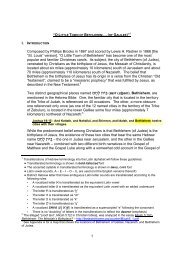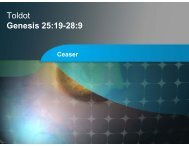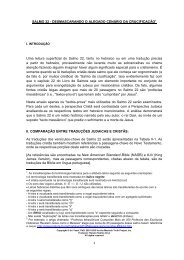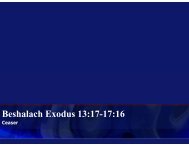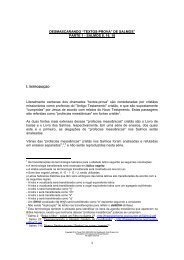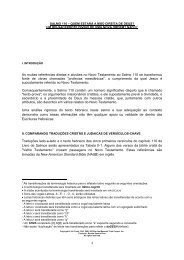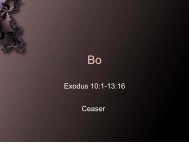Chayei Sarah Genesis 23:1-25:18 - The Jewish Home
Chayei Sarah Genesis 23:1-25:18 - The Jewish Home
Chayei Sarah Genesis 23:1-25:18 - The Jewish Home
Create successful ePaper yourself
Turn your PDF publications into a flip-book with our unique Google optimized e-Paper software.
<strong>Chayei</strong> <strong>Sarah</strong><br />
<strong>Genesis</strong> <strong>23</strong>:1-<strong>25</strong>:<strong>18</strong><br />
Ceaser
<strong>Chayei</strong> <strong>Sarah</strong><br />
<strong>Genesis</strong> <strong>23</strong>:1-<strong>25</strong>:<strong>18</strong><br />
Overview<br />
• <strong>Sarah</strong> dies at age 127 and is buried in the Machpeilah Cave in<br />
Hebron, which Abraham purchases from Ephron the Hittite for 400<br />
shekels of silver.<br />
• Abraham's servant, Eliezer, is sent laden with gifts to Charan to find a<br />
wife for Isaac. At the village well, Eliezer asks G-d for a sign: when the<br />
maidens come to the well, he will ask for some water to drink; the<br />
woman who will offer to give his camels to drink as well, shall be the<br />
one destined for his master's son.<br />
• Rebecca, the daughter of Abraham's nephew Bethuel, appears at the<br />
well and passes the "test". Eliezer is invited to their home, where he<br />
repeats the story of the day's events. Rebecca returns with Eliezer to<br />
the land of Canaan, where they encounter Isaac praying in the field.<br />
Isaac marries Rebecca, loves her, and is comforted over the loss of<br />
his mother.<br />
• Abraham takes a new wife, Keturah (Hagar) and fathers six additional<br />
sons, but Isaac is designated as his only heir. Abraham dies at age<br />
175 and is buried beside <strong>Sarah</strong> by his two eldest sons, Isaac and<br />
Ishmael.<br />
2
<strong>Chayei</strong> <strong>Sarah</strong><br />
<strong>Genesis</strong> <strong>23</strong>:1-<strong>25</strong>:<strong>18</strong><br />
<strong>The</strong> Torah section entitled <strong>Chayei</strong> <strong>Sarah</strong> ("<strong>The</strong> Life of <strong>Sarah</strong>") deals entirely<br />
with events that occurred after <strong>Sarah</strong>'s death. <strong>The</strong> first verse of the<br />
Parshah tallies the lifespan of the first of the Four Matriarchs of Israel:<br />
And the life of <strong>Sarah</strong> was one hundred years, twenty years and seven years;<br />
these were the years of <strong>Sarah</strong>'s life.<br />
<strong>The</strong> second verse reports:<br />
<strong>Sarah</strong> died in Kiryat Arba, that is Hebron, in the land of Canaan; and Abraham<br />
came to mourn for <strong>Sarah</strong>, and to weep for her.<br />
Presenting himself as "a stranger and a resident amongst you," Abraham<br />
approaches the people of Het with the request to purchase a plot of land<br />
for <strong>Sarah</strong>'s burial. Abraham is particularly interested in the Machpeilah<br />
Cave ("the double cave" or "the cave of the couples") and the surrounding<br />
field--a property belonging to Ephron the son of Chefer.<br />
Ephron declares that he is prepared to give the cave and field to Abraham<br />
free of charge, but also lets fall that he values the property at 400 silver<br />
shekels. So,<br />
Abraham weighed to Ephron the silver, which he had named in the hearing of<br />
the sons of Het, four hundred shekels of silver in negotiable currency...<br />
<strong>The</strong>n Abraham buried <strong>Sarah</strong> his wife in the cave of the field of Machpeilah<br />
before Mamre, that is Hebron in the Land of Canaan.<br />
Thus "the Machpeilah Field with the cave in it" in the heart of Hebron became<br />
the first <strong>Jewish</strong>ly-owned plot of land in the Holy Land.<br />
3
<strong>Chayei</strong> <strong>Sarah</strong><br />
<strong>Genesis</strong> <strong>23</strong>:1-<strong>25</strong>:<strong>18</strong><br />
And the life of <strong>Sarah</strong> was one hundred years, twenty years and seven<br />
years (<strong>23</strong>:1)<br />
At the age of twenty she was like age seven in beauty, and at the age of<br />
one hundred she was like age twenty in piety. [Another version: at<br />
one hundred she was like twenty in beauty, and at twenty she was<br />
like seven in piety.]<br />
(Rashi; Midrash Rabbah)<br />
Why does the Torah split up the tally of her years into three parts ("one<br />
hundred years," "twenty years" and "seven years")? To tell us that<br />
every day of her life was the equivalent of them all. At the age of one<br />
hundred years she was like age twenty in strength, and at age twenty<br />
she was like age seven in modesty and purity; at age seven she was<br />
like age twenty in intelligence, and at age twenty she was like age one<br />
hundred in righteousness.<br />
(Midrash HaGadol)<br />
And Abraham came to mourn for <strong>Sarah</strong> (<strong>23</strong>:2)<br />
Where did he come from? He came from Mount Moriah, <strong>Sarah</strong> having<br />
died of grief over the Binding of Isaac.<br />
(Midrash Rabbah)<br />
4
<strong>Chayei</strong> <strong>Sarah</strong><br />
<strong>Genesis</strong> <strong>23</strong>:1-<strong>25</strong>:<strong>18</strong><br />
I am a stranger and a resident amongst you (<strong>23</strong>:4)<br />
<strong>The</strong> Jew is a "resident" in the world, for the Torah instructs him not escape the physical reality<br />
but to inhabit it and elevate it. Virtually all the mitzvot (divine commandments) of the<br />
Torah are physical actions involving physical objects, in keeping with the Jew's mission to<br />
make a "dwelling for G-d in the material realm" by sanctifying the everyday materials of<br />
everyday life.<br />
At the same time, the Jew feels himself a "stranger" in the material world. His true home is a<br />
higher, loftier place, the world of spirit, the world of holiness and G-dliness from which his<br />
soul has been exiled and to which it yearns to return. Indeed, it is only because the Jew<br />
feels himself a stranger in the world that he can avoid being wholly consumed and<br />
overwhelmed by it, and maintain the spiritual vision and integrity required to elevate it and<br />
sanctify it as an abode for the divine presence.<br />
(<strong>The</strong> Lubavitcher Rebbe)<br />
<strong>The</strong> story is told of the visitor who, stopping by the home of the great Chassidic master Rabbi<br />
DovBer of Mezheritch, was outraged by the poverty he encountered there. Rabbi DovBer's<br />
home was bare of all furnishing, save for an assortment of rough wooden planks and<br />
blocks that served as benches for his students during the day and as beds for his family at<br />
night. "How can you live like this?" demanded the visitor. "I myself am far from wealthy,<br />
but at least in my home you will find, thank G-d, the basic necessities: some chairs, a<br />
table, beds..."<br />
"Indeed?" said Rabbi DovBer. "But I don't see any of your furnishings. How do you manage<br />
without them?"<br />
"What do you mean? Do you think that I schlep all my possessions along with me wherever I<br />
go? When I travel, I make do with what's available. But at home--a person's home is a<br />
different matter altogether!"<br />
"Ah, yes," said Rabbi DovBer. "At home, it is a different matter altogether..."<br />
(Likkutei Dibburim)<br />
5
<strong>Chayei</strong> <strong>Sarah</strong><br />
<strong>Genesis</strong> <strong>23</strong>:1-<strong>25</strong>:<strong>18</strong><br />
<strong>The</strong> Cave of Machpeilah (<strong>23</strong>:9)<br />
Rav and Samuel differ as to its meaning. One says that the cave consisted<br />
of a lower and upper chamber. <strong>The</strong> other says that it had multiples of<br />
couples [interred in it]: Adam and Eve, Abraham and <strong>Sarah</strong>, Isaac and<br />
Rebecca, Jacob and Leah.<br />
(Talmud, Eruvin 53a)<br />
And Ephron the Hittite answered Abraham: "<strong>The</strong> field I give to you, and<br />
the cave that is in it, I give it to you..." (<strong>23</strong>:11)<br />
Said Rabbi Eleazar: <strong>The</strong> righteous promise little and perform much--<br />
Abraham promised his guests "a morsel of bread" (<strong>Genesis</strong> <strong>18</strong>:5) and<br />
then "ran to the herd and fetched a calf tender and good, and he<br />
hurried to prepare it" (ibid., v. 7).<br />
On the other hand, the wicked promise much and do not perform even a<br />
little. Initially Ephron proclaimed, "A piece of land worth four hundred<br />
shekels of silver, what is that between me and you?" But in the end,<br />
"Abraham weighed to Ephron the silver which he had named in the<br />
hearing of the sons of Hetfour hundred shekels of silver in negotiable<br />
currency."<br />
(Talmud, Bava Metzia 87a)<br />
6
<strong>Chayei</strong> <strong>Sarah</strong><br />
<strong>Genesis</strong> <strong>23</strong>:1-<strong>25</strong>:<strong>18</strong><br />
And Abraham weighed to Ephron the silver (<strong>23</strong>:16)<br />
Said Rabbi Judan the son of Rabbi Simon: This is one of the three places regarding<br />
which the nations of the world cannot accuse Israel and say, "You have stolen<br />
them." <strong>The</strong> three places are: the Cave of Machpeilah, the site of the Holy Temple,<br />
and the tomb of Joseph at Shechem. <strong>The</strong> cave of Machpeilah, as it is written: "And<br />
Abraham weighed to Ephron the silver"; <strong>The</strong> Temple: "So David gave to Ornan for<br />
the place six hundred shekels of gold" (I Chronicles 21:<strong>25</strong>). And Joseph s tomb:<br />
"And [Jacob] bought the parcel of land (at Shechem) for a hundred pieces of silver<br />
(<strong>Genesis</strong> 33:19).<br />
(Midrash Rabbah, <strong>Genesis</strong> 33:19)<br />
Four hundred shekels of silver (<strong>23</strong>:16)<br />
As per Leviticus 27:16, a field the size of a beit-kur, which is the equivalent of 75,000<br />
square cubits, represents a value of 50 silver shekels. Thus, the size of the field<br />
which Abraham purchased for 400 silver shekels was eight kur, or 600,000 square<br />
cubits.<br />
A square cubit (approx. 20 inches by 20 inches) is the space occupied by a single<br />
person. This means that Abraham purchased a plot of land that provides an<br />
individual "space" for each of the 600,000 souls of Israel.<br />
(Paaneach Raza)<br />
Our sages tell us that the Torah contains 600,000 letters (counting the spaces between<br />
letters), for each Jew possesses something of the Torah. <strong>The</strong> same is true of the<br />
Land of Israel. Israel is the eternal inheritance of the <strong>Jewish</strong> people, equally the<br />
property of every individual Jew. And so it has been from the very first moment of<br />
<strong>Jewish</strong> ownership of the Holy Land: the first plot of land obtained by the first Jew<br />
included a share for every <strong>Jewish</strong> soul.<br />
(<strong>The</strong> Lubavitcher Rebbe)<br />
7
<strong>Chayei</strong> <strong>Sarah</strong><br />
<strong>Genesis</strong> <strong>23</strong>:1-<strong>25</strong>:<strong>18</strong><br />
Eliezer's Mission<br />
"Abraham was old and come along in days; and G-d had blessed Abraham in all<br />
things"--so it was time to find a wife for Isaac.<br />
Abraham summons Eliezer, "the eldest servant of his house, who ruled over all that<br />
he had" and says to him:<br />
"...Swear by G-d, G-d of heaven and G-d of the earth, that you will not take a wife<br />
to my son of the daughters of the Canaanites among whom I dwell; but you<br />
shall go to my country, and to my kindred, and take a wife to my son Isaac..."<br />
And the servant took ten camels of the camels of his master, and departed; all the<br />
goods of his master were in his hand. And he arose and went to Aram<br />
Naharayim, to the city of [Abraham's brother,] Nachor.<br />
How to find the right woman to marry Isaac and become the second matriarch of<br />
Israel? Eliezer had a plan.<br />
He made his camels kneel down outside the city by a well of water at the time of<br />
evening, at the time that the women go out to draw water.<br />
And then he prayed:<br />
"O L-rd, the G-d of my master Abraham... Behold, I stand here by the well of<br />
water, and the daughters of the men of the city come out to draw water.<br />
"Let it come to pass that the maiden to whom I shall say, 'Please, set down your<br />
pitcher that I may drink,' and she shall say, "Drink, and I will give your camels<br />
drink also'-- she is the one You have appointed for Your servant Isaac..."<br />
8
<strong>Chayei</strong> <strong>Sarah</strong><br />
<strong>Genesis</strong> <strong>23</strong>:1-<strong>25</strong>:<strong>18</strong><br />
Eliezer's Mission<br />
Things now happen swiftly:<br />
Before he had finished speaking, Rebecca came out... with her pitcher upon her<br />
shoulder. And the girl was very fair to look upon...<br />
<strong>The</strong> servant ran to meet her, and said: "Please, let me drink a little water from your<br />
pitcher." And she said: "Drink, my lord"; and she hastened, and let down her pitcher<br />
upon her hand, and gave him drink.<br />
And when she had done giving him drink, she said: "I will draw water for your camels<br />
also, until they have done drinking." And she hastened, and emptied her pitcher into<br />
the trough, and ran again to the well to draw water, and drew for all his camels.<br />
Eliezer "looked at her wonderingly, but kept his peace, waiting to know whether G-d had<br />
made his journey prosperous or not" for he still had to determine if she met the<br />
criteria insisted upon by Abraham--that Isaac's wife be "from my kindred."<br />
Still, he must have been fairly certain that she was the one, because he immediately<br />
gave her "a golden ring of half a shekel weight, and two bracelets for her hands of<br />
ten shekels weight of gold," in effect betrothing her to Isaac. Only then did he ask:<br />
"Whose daughter are you? Tell me, I pray thee: is there room in your father's house for<br />
us to lodge in?"<br />
And she said to him: "I am the daughter of Bethuel the son of Milka, whom she bore to<br />
Nachor."<br />
She was Abraham's brother's granddaughter! <strong>The</strong>n she answered his second question:<br />
"We have both straw and provender enough, and room to lodge in."<br />
9
<strong>Chayei</strong> <strong>Sarah</strong><br />
<strong>Genesis</strong> <strong>23</strong>:1-<strong>25</strong>:<strong>18</strong><br />
Abraham was old and come along in days (24:1)<br />
When Abraham aged, he did not merely pass through the days of his life: he<br />
accumulated them. Each day was fully utilized, so that they were fully<br />
possessed by him.<br />
(<strong>The</strong> Zohar)<br />
I will make you swear by G-d, G-d of heaven and G-d of the earth (24:3)<br />
But further on (in verse 7) he says, "G-d, the G-d of heaven, who took me from my<br />
Father's house."<br />
This is what Abraham was saying to Eliezer: "When G-d summoned me from the<br />
house of my father, he was G-d of the heavens but not of the earth: the<br />
inhabitants of the earth did not recognize Him and His name was not referred<br />
to in the land. But now that I have made His name familiar in the mouths of His<br />
creatures, He is G-d in both heaven and earth."<br />
(Rashi)<br />
Before he finished speaking, behold, Rebecca came out (24:15)<br />
Three people were answered by G-d as their words left their mouths: Eliezer, the<br />
servant of Abraham; Moses and Solomon. Eliezer, as it is written, Before he<br />
finished speaking, behold, Rebecca came out. Moses, as it is written, As he<br />
concluded saying all these things, the ground split open... Solomon, as it is<br />
written, As Solomon concluded praying, the fire descended from the heavens...<br />
(Midrash Rabbah)<br />
10
<strong>Chayei</strong> <strong>Sarah</strong><br />
<strong>Genesis</strong> <strong>23</strong>:1-<strong>25</strong>:<strong>18</strong><br />
And the man took a golden ring, a half-shekel in weight; and two<br />
bracelets of ten shekels weight of gold for her hands (24:22)<br />
A half-shekel--to allude to the shekalim contributed by the people of<br />
Israel [for the construction of the Sanctuary in the desert], a halfshekel<br />
per head.<br />
(Rashi)<br />
And he gave straw and provender for the camels... And there was set<br />
food before him to eat (24:32-33)<br />
First he fed the animals, and afterward he was served food. For it is<br />
forbidden for a person to taste anything until he feeds his animals<br />
(Midrash HaGadol)<br />
And he said: "I will not eat, until I have told my errand." And he said:<br />
"Speak" (24:33)<br />
Said Rabbi Acha: <strong>The</strong> talk of the servants of the fathers is more desirable<br />
than the Torah scholarship of the children. For Eliezer's story, which<br />
takes up two or three pages in the Torah, is twice recounted, while<br />
many principles of Torah law are conveyed with a single word or<br />
letter.<br />
(Rashi; Midrash Rabbah)<br />
11
<strong>Chayei</strong> <strong>Sarah</strong><br />
<strong>Genesis</strong> <strong>23</strong>:1-<strong>25</strong>:<strong>18</strong><br />
<strong>The</strong> Family of the Bride<br />
Rebecca runs home, and Eliezer and his ten camels follow. <strong>The</strong>re he is greeted by Rebecca's<br />
brother, Laban, who provides feed for his camels and water for him and his camel-drivers<br />
to wash their feet.<br />
And there was set food before him to eat, but he said: "I will not eat, until I have told my<br />
errand."<br />
And he said: "Speak."<br />
And he said: "I am Abraham's servant.<br />
"And G-d has blessed my master greatly... He has given him flocks, and herds, and silver, and<br />
gold, and menservants, and maidservants, and camels, and asses.<br />
"And <strong>Sarah</strong>, my master's wife, bore a son to my master when she was old; and to him he has<br />
given all that he has."<br />
<strong>The</strong> Torah now repeats the entire sequence of events--Abraham's instructions to Eliezer;<br />
Eliezer's arrival at the well; his prayer and the "test" he invented; Rebecca's appearance<br />
and her actions; Eliezer's gifts to her and his conversation with her--this time as told by<br />
Eliezer to Rebecca's family. Laban and Bethuel respond:<br />
"<strong>The</strong> thing comes from G-d; we cannot speak to you bad or good. Behold, Rebecca is before<br />
you, take her, and go, and let her be your master's son's wife, as G-d has spoken."<br />
<strong>The</strong> next morning, however, her mother and brother (Bethuel is mysteriously absent) have<br />
some last-minute objections: there are many arrangements to be made, a trousseau to be<br />
prepared. "Let the girl stay with us a year or ten months; after that she shall go."<br />
Eliezer, however, insists that they must set out immediately. "Hinder me not, seeing that G-d<br />
has prospered my way; send me away that I may go to my master."<br />
And they said: "We will call the girl, and inquire at her mouth." And they called Rebecca, and<br />
said to her: "Do you want to go with this man?"<br />
And she said: "I will go."<br />
12
<strong>Chayei</strong> <strong>Sarah</strong><br />
<strong>Genesis</strong> <strong>23</strong>:1-<strong>25</strong>:<strong>18</strong><br />
And <strong>Sarah</strong>, my master's wife, bore a son to my master in her old age; and to him he has<br />
given all that he possesses (24:36)<br />
Eliezer showed them a deed of bequest in which Abraham had given Isaac all his<br />
possessions, so that they should hurry to send their daughter.<br />
(Rashi)<br />
As the first <strong>Jewish</strong> marriage described by the Torah, the union of Isaac and Rebecca is<br />
the prototype of all subsequent <strong>Jewish</strong> marriages, both in the literal sense of<br />
building a home in Israel and in the broader sense of uniting the physical world with<br />
its cosmic soul, thereby fulfilling the Divine purpose in creation of making the world<br />
a dwelling place for G-d. In this endeavor is invested everything that Abraham<br />
possesses: all the resources--spiritual and material--with which the Almighty His<br />
people to the end of realizing His purpose in creation.<br />
(<strong>The</strong> Lubavitcher Rebbe)<br />
I arrived today at the well (24:42)<br />
From Hebron to Charan is a 17-day journey, and Eliezer made the trip in three hours.<br />
(Pirkei d'Rabbi Eliezer, ch. 16)<br />
And her brother and mother said... (24:55)<br />
But where was Bethuel? He wished to hinder it, and so he was smitten during the night.<br />
(Midrash Rabbah)<br />
We will call the girl, and inquire at her mouth (24:57)<br />
From this we learn that a woman should not be given in marriage without her consent.<br />
(Rashi)<br />
13
<strong>Chayei</strong> <strong>Sarah</strong><br />
<strong>Genesis</strong> <strong>23</strong>:1-<strong>25</strong>:<strong>18</strong><br />
Marriage<br />
And Rebecca and her maids arose, and they rode upon the<br />
camels, and followed the man; and the servant took Rebecca<br />
and went his way.<br />
And Isaac went out to meditate in the field at the evening time;<br />
and he lifted up his eyes and saw, behold, camels were<br />
coming.<br />
Rebecca lifted up her eyes and saw Isaac; and she fell from the<br />
camel.<br />
And she said to the servant: "Who is this man who walks in the<br />
field to meet us?" And the servant said: "It is my master." And<br />
she took her veil, and covered herself...<br />
And Isaac brought her into the tent [of] his mother <strong>Sarah</strong>. And he<br />
took Rebecca, and she became his wife, and he loved her; and<br />
Isaac was comforted after his mother.<br />
14
<strong>Chayei</strong> <strong>Sarah</strong><br />
<strong>Genesis</strong> <strong>23</strong>:1-<strong>25</strong>:<strong>18</strong><br />
Isaac went out to meditate in the field... and behold, camels were coming (24:63)<br />
Sometimes a person must go to his soulmate, and sometimes his soulmate comes to<br />
him. In the case of Isaac, his wife came to him, as it is written, "And he saw, and,<br />
behold, there were camels coming." Jacob, however, went to his wife as it is written,<br />
"And Jacob went out of Be'er Sheva..." (<strong>Genesis</strong> 28:10).<br />
(Midrash HaGadol)<br />
And Isaac brought her into the tent [of] his mother <strong>Sarah</strong> (24:67)<br />
This verse can also be punctuated "And Isaac brought her into the tent--his mother<br />
<strong>Sarah</strong>" implying that when she came into the tent she became, in effect, his mother<br />
<strong>Sarah</strong>.<br />
For as long as <strong>Sarah</strong> lived, a cloud (signifying the divine presence) hung over her tent;<br />
when she died, the cloud disappeared; but when Rebecca came, it returned.<br />
As long as <strong>Sarah</strong> lived, her doors were wide open; at her death that openhandedness<br />
ceased; but when Rebecca came, it returned.<br />
As long as <strong>Sarah</strong> lived, there was a blessing on her dough, and the lamp used to burn<br />
from the evening of the Sabbath until the evening of the following Sabbath; when<br />
she died, these ceased; but when Rebecca came, they returned.<br />
(Midrash Rabbah; Rashi)<br />
And Isaac was comforted after his mother's death (24:67)<br />
Such is the way of the world: As long as a person's mother is alive, he is attached to<br />
her; when she dies, he finds comfort in his wife.<br />
(Rashi)<br />
15
<strong>Chayei</strong> <strong>Sarah</strong><br />
<strong>Genesis</strong> <strong>23</strong>:1-<strong>25</strong>:<strong>18</strong><br />
<strong>The</strong> Other Sons of Abraham<br />
Our Parshah has one more event to relate before concluding:<br />
<strong>The</strong>n again Abraham took a wife, and her name was Keturah. And she bore him<br />
Zimran, and Yakshan, and Medan, and Midyan, and Yishbak, and Shuah.<br />
<strong>The</strong> Torah, however, is quick to point out that these additional sons of Abraham<br />
were not to be included in the Abrahamic legacy:<br />
Abraham gave all that he had to Isaac. But to the sons of the concubines which<br />
Abraham had, Abraham gave gifts, and sent them away from his son, while he<br />
yet lived, eastward, to the east country.<br />
Thus the Torah concludes its account of Abraham's life:<br />
And these are the days of the years of Abraham's life which he lived: a hundred<br />
years, and seventy yeas, and five years. <strong>The</strong>n Abraham expired, and died in a<br />
good old age, an old man, and full of years; and was gathered to his people.<br />
And his sons Isaac and Ishmael buried him in the Cave of Machpeilah, in the field<br />
of Ephron the son of Zohar the Hittite, which is before Mamre; the field which<br />
Abraham purchased from the sons of Het: there was Abraham buried, and<br />
<strong>Sarah</strong> his wife.<br />
<strong>The</strong> Torah also informs us that Ishmael died at age 137 years, after fathering<br />
twelve sons, each of whom was the prince of a domain; the territories of these<br />
twelve clans extended "From Havilah to Shur, which is before Egypt, all the<br />
way to Assyria."<br />
16
<strong>Chayei</strong> <strong>Sarah</strong><br />
<strong>Genesis</strong> <strong>23</strong>:1-<strong>25</strong>:<strong>18</strong><br />
Abraham took a wife, and her name was Keturah (<strong>25</strong>:1)<br />
This is Hagar. She is called Keturah because her deeds were now<br />
as pleasing as the ketoret (the incense offered in the Holy<br />
Temple)<br />
(Midrash Rabbah; Rashi)<br />
And his sons Isaac and Ishmael buried him in the Cave of<br />
Machpeilah (<strong>25</strong>:9)<br />
This implies that Ishmael did teshuvah (returned to a righteous<br />
life) and placed Isaac before himself.<br />
(Rashi)<br />
17
RABBI BEREL WEIN<br />
Wein Online<br />
<strong>The</strong> city of Chevron is very prominent in our world and in the daily news reports. <strong>The</strong><br />
news from Chevron is not always encouraging. It is a tough place, this Chevron of<br />
ours - a tough place to live and a tough place to leave. In the Torah we read of the<br />
purchase of the Cave of Machpela by our father Avraham. This purchase was<br />
supposed to eternally establish that holy place as being the property of the people of<br />
Israel. But it hasnâ€t worked out that way. Over the long centuries, Yishmael and<br />
his descendants and Eisav and his descendants have successfully contested Israel<br />
for these premises innumerable times. For over a millennium Jews were not allowed<br />
to enter the building, which supposedly rests on the top of that burial cave. <strong>The</strong> right<br />
of Jews to live in Chevron is and has always been contested far more bitterly than<br />
even the right of Jews to live in Jerusalem. Why? What is the secret of Chevron that<br />
makes it so dangerous and so contested a place for <strong>Jewish</strong> settlement and security?<br />
<strong>The</strong> Talmud mentions that there are three locations in the Land of Israel, which are<br />
indisputably the legal property of the <strong>Jewish</strong> people. <strong>The</strong>y are the Cave of Machpela<br />
in Chevron, the field outside Shechem/Nablus in Samaria, and the Temple Mount in<br />
Jerusalem. All three locations were purchased by the leaders of Israel - Avraham,<br />
Yakov, David - for good and valuable consideration and for full, if not more than full,<br />
market value. <strong>The</strong> purchases and the details of those purchases are all recorded in<br />
the Bible. Yet, over our long history, even till this very moment, our title to all three<br />
locations is in dispute. <strong>The</strong> insight into this paradoxical situation may be that the very<br />
reason these properties are contested - because our claim to them is based on manmade<br />
law, contracts and deeds and not on Divine promise.<br />
<strong>18</strong>
RABBI BEREL WEIN<br />
Wein Online<br />
All contracts, even all purchases in this world of ours, are always subject to review, revision and<br />
cancellation. Governments rise and fall, circumstances and situations change, the definition of<br />
"rights" is altered by fiat or common consent. In short, nothing ever remains the same. Nothing<br />
in the world created by man is permanent. <strong>The</strong>refore, the general world, and certainly the Arab<br />
world, contests our claim of ownership to these parcels of land in Israel. Our deed is outdated<br />
and no longer valid, they say. We abandoned our claim long ago by not being present on those<br />
properties for long centuries. <strong>The</strong> Indian tribes in America also had signed and legal<br />
government deeds to large sections of the United States, but when the circumstances<br />
"changed," the deeds were abrogated, and the Indian tribes' claim to the land was disallowed.<br />
Claims to land are not very secure if they are based only upon legalities, purchases and<br />
contracts. <strong>The</strong> entire thrust of the book of Bereshith is that the world and its lands and<br />
properties belong not to man but to the Creator.<br />
<strong>The</strong> claim of the <strong>Jewish</strong> people to the Land of Israel is not based on contracts and deeds. Indeed, it<br />
is not based even on Balfour Declarations and United Nations resolutions. It is based upon the<br />
Godly promise to our ancestors that the Land of Israel belongs, by right of Godly fiat, to their<br />
descendants. Those Jews, who, for various personal and faith reasons, deny this Godly<br />
promise, are very hard pressed to justify the existence of the state of Israel and the <strong>Jewish</strong><br />
claim to Jerusalem. Without this justification of belief and <strong>Jewish</strong> tradition, the claim of the<br />
nations of the world that "you are thieves" sounds plausible and correct. <strong>The</strong> faith of Israel is<br />
based upon the evelation and will of our eternal Creator. We certainly have to do our part, for<br />
God certainly helps those who help themselves. But, in the final analysis, it is obvious that we<br />
derive our rights and claims not merely from current behavior, but rather from rights based upon<br />
ancient faith and religious tenets and beliefs. As Rabbi Saadya Gaon stated: "Our nationhood is<br />
based solely on the Torah." Chevron and the Cave of Machpela prove how right he is.<br />
19
RABBI LABEL LAM<br />
Dvar Torah<br />
And these are the days of the years of the life of Avraham which he<br />
lived: One hundred years and seventy years and five years. And<br />
Avraham expired and died at a good old age, mature and content and<br />
he was gathered to his people." (Breishis ( Breishis 22:7-8) 22:7 8)<br />
<strong>The</strong>re are descriptions given about the conclusion of Avraham's life<br />
that are not found by anyone else. Why does the verse mention "the "the<br />
days of the years" of his life? By Yishmael, Yishmael,<br />
who is immediately<br />
juxtaposed, only the years of his life are counted! Why does the verse<br />
tell us "that he lived"? What else does one do with their life? It seems<br />
rather redundant.<br />
This quote from the Zohar (Parshas Parshas Emor) Emor)<br />
might help us to focus in:<br />
"We learn that when one does a deed down below it arouses a reaction reaction<br />
above. If a person behaves in a certain way below a commensurate<br />
force is awakened on high. Someone does a deed of kindliness in this<br />
world, kindliness is awakened above. It rests upon that day and<br />
crowns it for him. If a person acts mercifully below, mercy is aroused aroused<br />
on that day and it is crowned on his account. That day then stands stands<br />
as<br />
a shield for him whenever it becomes necessary for him...“<br />
him...<br />
20
RABBI LABEL LAM<br />
Dvar Torah<br />
It seems from the Zohar that there's a unit of time, which is not arbitrary, it is<br />
called a "day". We are told that a given day is titled after the person whose<br />
behavior wakes up the heavenly mood of that day. Each day has a unique<br />
reason for being and different expression, as it says, "Day after after<br />
day utters<br />
speech and night after night declares knowledge." (Tehillim ( Tehillim 19)<br />
I have observed that little children live happily in twenty-four twenty four hour cycles. One<br />
day everything is good. <strong>The</strong> next, for whatever reason, it's terrible. terrible.<br />
It could be<br />
something as simple as not liking snack. After we get a little older, older,<br />
we tend to<br />
look back at good years and bad, be it in school or business. Later Later<br />
still we<br />
begin to talk about the 80's or the 90's. Decades start to take on nostalgic color<br />
and meaning. By the end, in the nursing home, there etched on the the<br />
faces, a<br />
lifetime of experiences, we see distinctly drawn expressions of sweetness or<br />
bitterness. <strong>The</strong> whole life is thought of as either good or bad.<br />
As "twelve step" lingo leeks out into daily life it has become popular popular<br />
to talk<br />
about "one day at a time". About Avraham too it states in the verse, "And<br />
Avraham the elder came with his days...(Breishis<br />
days...( Breishis 24:1) Each day was<br />
accounted for and filled with maximum productivity. In the army, in college and<br />
in prison people "do years". We are taught by the life of Avraham to "do days".<br />
21
RABBI LABEL LAM<br />
Dvar Torah<br />
It's important to know that this same Avraham spent decades of his early days<br />
and years in intensive research. He didn't have a clear path of tradition from<br />
birth. At the age of three he posited a theory about the Oneness of the <strong>The</strong><br />
Creator. Until he had completed the paradigm of his thesis and began began<br />
his<br />
career teaching he was already in his 50's.<br />
Perhaps, one could suggest that those days and years should be deducted deducted<br />
from the totality of his productive life. That time, though, was not for naught.<br />
He had to begin his search and proceed methodically from wherever wherever<br />
he was.<br />
Both the time in search of the greatest and clearest picture of reality and the<br />
time spent living up to what he came know are all accounted to him him<br />
as "the<br />
days of the years that he lived".<br />
<strong>The</strong> contentment he achieved at the conclusion of his life was not not<br />
the product<br />
of a last minute lunge for meaning. No! If life is perceived as "good" in the end,<br />
it is the cumulative result of moment by moment and daily choices choices<br />
over many<br />
years and changing conditions to happily confront the challenge of today.<br />
22
Final Thoughts<br />
Ceaser<br />
All of what we are, we see, we did and will do, is the<br />
Work of HaShem<br />
This we celebrate fifty-two times a Year on Shabbat.<br />
“May it be Your Will, HaShem, that the Holy Temple be<br />
rebuilt speedily in our days and grant us our share in<br />
Your Torah….”<br />
Shabbat Shalom<br />
<strong>23</strong>


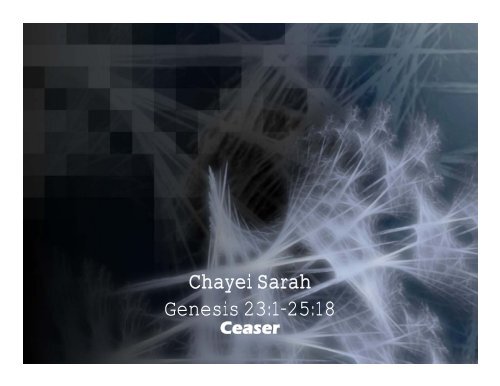
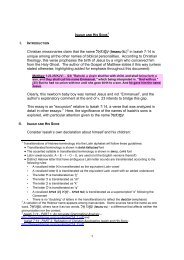
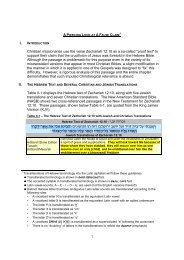
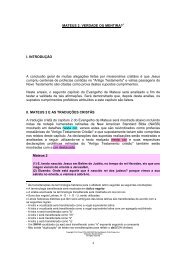
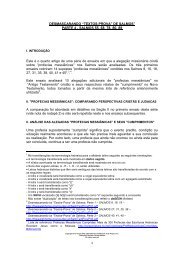
![Don't Mess with the Blood [Leviticus 17:11] - The Jewish Home](https://img.yumpu.com/41659571/1/190x245/dont-mess-with-the-blood-leviticus-1711-the-jewish-home.jpg?quality=85)

